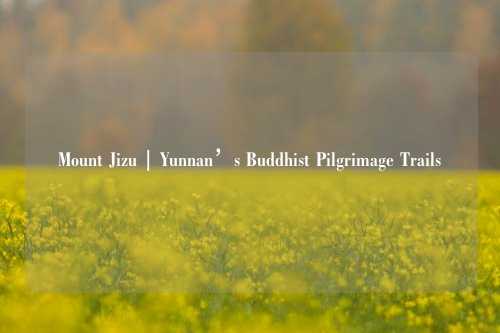Mount Jizu | Yunnan’s Buddhist Pilgrimage Trails
Mount Jizu, nestled in the heart of Yunnan Province in southwestern China, is a place where spirituality and nature converge. Known as "The Mountain of Ten Thousand Buddhas," Mount Jizu is a revered site for Buddhists, offering a journey that is both physically and spiritually transformative. The mountain is not just a destination for pilgrims but also a UNESCO World Heritage site, recognized for its and historical significance.
The origins of Mount Jizu can be traced back to the 8th century, when the Tibetan king Trisong Detsen invited Indian Buddhist大师 Budai to Yunnan to spread the teachings of Buddhism.budai chose Mount Jizu as a site for meditation and修行, and the mountain became a hub for Buddhist learning and practice. Over the centuries, the mountain grew in prominence, attracting scholars, monks, and pilgrims from across Asia. Today, Mount Jizu stands as a testament to the enduring influence of Buddhism in China and beyond.

The most iconic feature of Mount Jizu is the 10,000 Buddha carvings, which are carved into the cliffs and stones along the pilgrimage trails. These carvings, dating back to the 8th century, depict a wide variety of Buddhas, bodhisattvas, and other Buddhist figures. Each carving is a work of art, showcasing the skill and devotion of the artisans who created them. Walking among these carvings is a awe-inspiring experience, as they seem to blend ly with the natural landscape, creating a sense of harmony between the sacred and the secular.
The pilgrimage trails of Mount Jizu are among the most well-preserved and revered in China. These trails wind through forested valleys, over rugged mountains, and past serene lakes, offering pilgrims a chance to connect with nature while reflecting on their faith. The trails are divided into several routes, ranging in difficulty from easy strolls to arduous climbs, catering to pilgrims of all ages and fitness levels. Each step of the journey is steeped in tradition, with pilgrims often carrying offerings such as incense, flowers, and prayer flags to pay homage to the sacred site.
One of the most popular trails leads to the Tise Temple, a historic monastery perched on the slopes of Mount Jizu. Established in the 8th century, the temple is a living repository of Buddhist culture, with monks and scholars continuing to study and teach the dharma. The temple’s architecture is a blend of Tibetan and Chinese styles, reflecting the mountain’s position as a crossroads of Buddhist traditions. Pilgrims who reach the temple are often greeted with a sense of peace and fulfillment, as they have completed a significant portion of their spiritual journey.
Mount Jizu is also a haven for nature lovers, with its diverse ecosystems supporting a wide array of flora and fauna. The mountain’s forests are home to ancient trees, vibrant wildflowers, and rare species of wildlife. As pilgrims traverse the trails, they are reminded of the interconnectedness of all life, and the importance of preserving the natural world. The mountain’s beauty is not just a backdrop for spiritual reflection but an integral part of the pilgrimage experience.
For those seeking a deeper connection to their faith or a sense of inner peace, Mount Jizu offers a opportunity to reflect and recharge. The mountain’s combination of heritage, natural beauty, and spiritual significance makes it a destination unlike any other. Whether you are a seasoned pilgrim or simply curious about Buddhism, a visit to Mount Jizu is an enriching and transformative experience.
The pilgrimage to Mount Jizu is more than just a physical journey; it is a spiritual odyssey that challenges the mind, body, and soul. The trails are lined with temples, monasteries, and shrines, each serving as a reminder of the mountain’s rich Buddhist heritage. Along the way, pilgrims are met with scenes of beauty and tranquility, from the misty valleys to the sun-kissed peaks.
One of the most aspects of the pilgrimage is the opportunity to engage with the local community. The Bai people, the indigenous inhabitants of the region, have lived in the shadow of Mount Jizu for centuries, and their culture is deeply intertwined with the mountain’s spiritual significance. Many Bai villages are located along the pilgrimage trails, offering visitors a chance to experience the way of life. In these villages, you can encounter skilled artisans crafting everything from prayer flags to musical instruments.
The sense of community and shared purpose among the pilgrims is another aspect that makes the journey to Mount Jizu so special. Pilgrims from all walks of life, guided by a shared faith, come together to support one another along the trails. It is not uncommon to hear stories of strangers becoming friends, or of acts of kindness that highlight the compassion at the heart of Buddhist teachings.
Mount Jizu is also a place of personal transformation. For many pilgrims, the journey is a opportunity to confront their fears, let go of past grievances, and embrace a more mindful way of life. The physical challenge of the trails serves as a metaphor for the journey of self-discovery, with each step bringing pilgrims closer to their inner selves.
As you ascend the mountain, you will pass through several key shrines and temples, each with its own charm and history. The Half Moon Temple, for example, is a serene spot where pilgrims can pause to reflect and offer prayers. The temple’s name refers to the shape of the mountain range as seen from certain angles, a reminder of the delicate balance between humanity and nature.
Another must-visit site is the Meditation Cave, a small grotto where ancient monks once meditated in solitude. The cave is said to be a place of spiritual energy, and those who spend time there often report feeling a deep sense of calm and clarity. The walls of the cave are adorned with carvings and murals, each telling a story of Buddhist wisdom and enlightenment.
The summit of Mount Jizu offers the most breathtaking views of the surrounding landscape. On a clear day, pilgrims can see for miles, taking in the snow-capped peaks of the Tibetan Plateau and the lush greenery of the Yunnan valleys. The feeling of standing at the top, surrounded by the natural world, is a reminder of humanity’s place within the grander scheme of existence.
For those who make the journey, the experience of climbing Mount Jizu is often life-changing. The challenges faced along the way, whether physical or spiritual, serve as a powerful metaphor for the obstacles we all encounter in life. The sense of achievement that comes with reaching the summit is matched only by the inner peace and clarity that many pilgrims report feeling afterward.
Mount Jizu is a place where the past and present converge, where ancient traditions are kept alive in a modern world. It is a destination that speaks to the universal human quest for meaning, connection, and understanding. For anyone willing to embark on the pilgrimage, Mount Jizu offers a journey that is as much about the heart as it is about the feet.
In the end, the experience of visiting Mount Jizu is one that stays with you long after you leave. Whether it is the beauty of the landscape, the richness of the culture, or the depth of the spiritual insights gained, the memory of this journey lingers in the heart, a constant reminder of the beauty and complexity of life. So, if you ever find yourself in Yunnan, take the time to visit Mount Jizu, and let its sacred trails guide you on a journey of discovery and transformation.
















